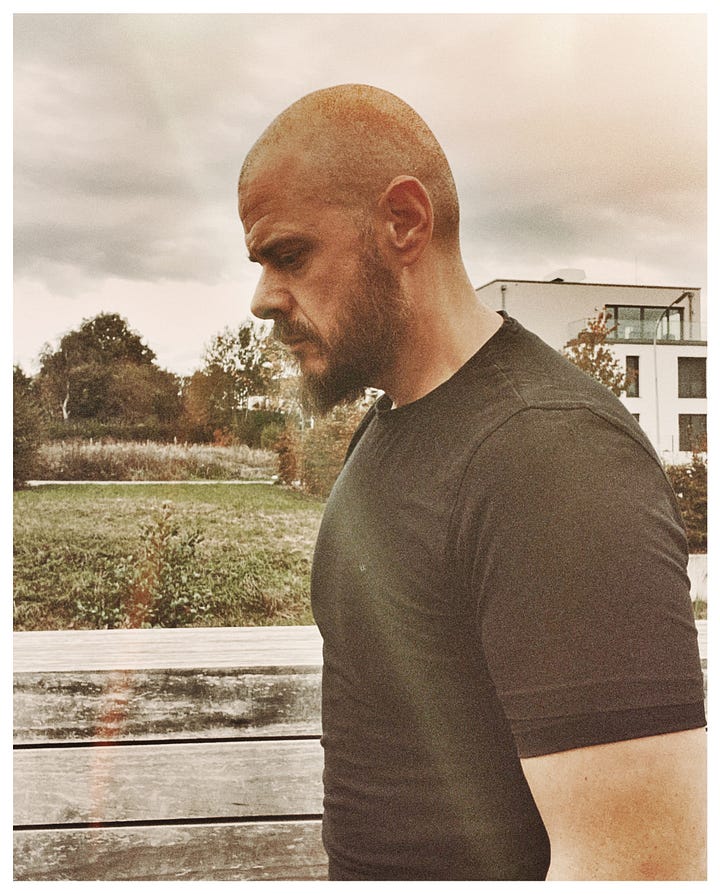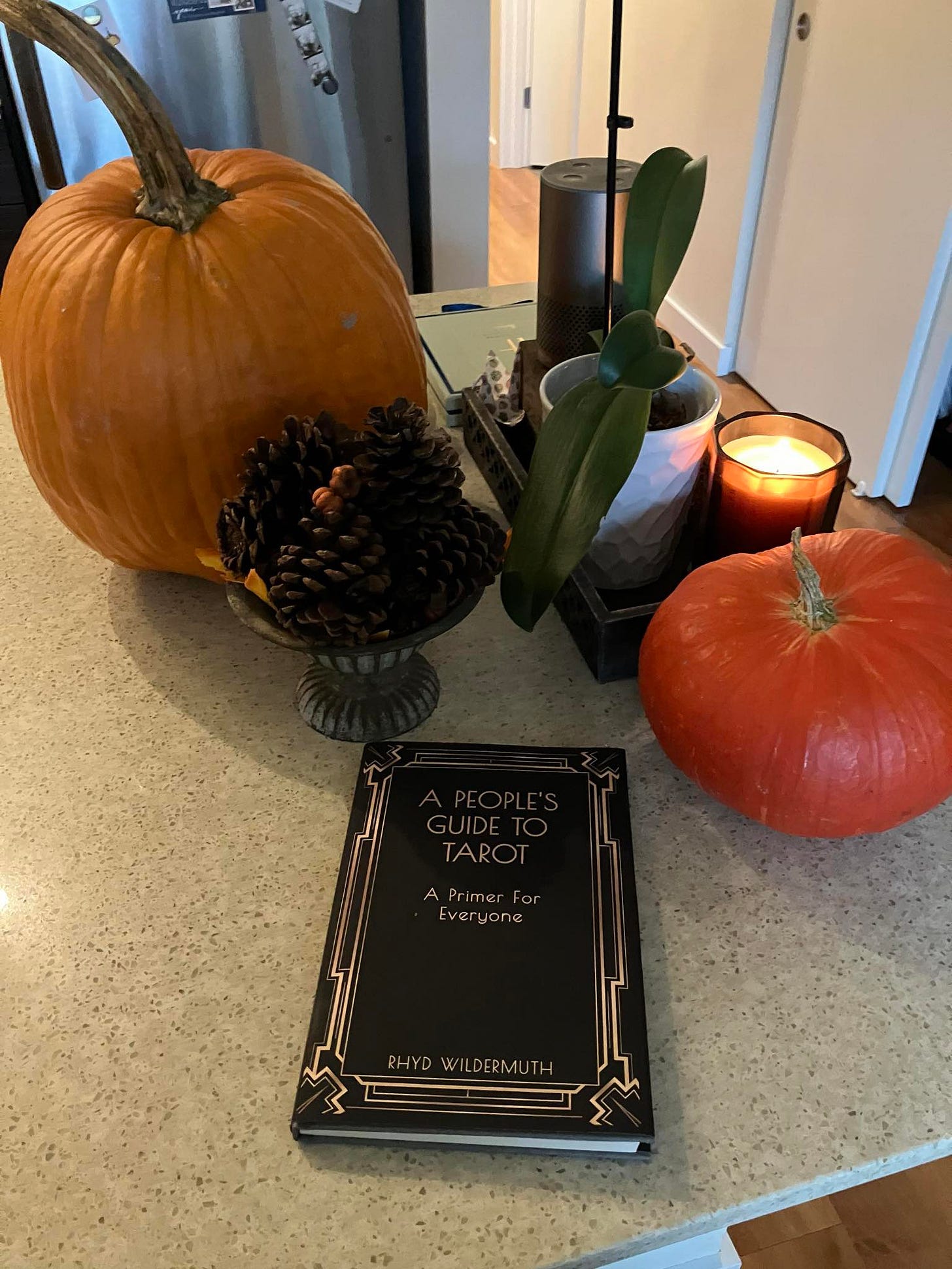Sundry Notes, October
Feeling your own weight, "A Big Jew Problem," this month's recommendation, and some travel and other updates.
I. Feeling your own weight
In weight lifting, there’s no real objective measure of what it means to be “strong.” Instead, everything’s quite relative, and necessarily based in comparison.
Of course, comparison can lead you down really dark paths sometimes, especially when you do it wrong. This happens when we try to compare radically different things — or in this case, bodies — against each other, discarding important differences. But, paradoxically, it’s only through comparison that we even become aware of those important differences.
It’s in gym work that I’ve finally begun to understand all this. I’m a body moving heavy things around, and there are other bodies around me doing the same thing. Some of those bodies are taller, some are shorter. Some are older and some — more than I’d like to admit — are younger. Some of them started out thin and got bigger, while others started out big and got thinner. Some are one sex, and some are the other. And even more important, some of them have been moving heavy things around for a long time, while others just started.
All those differences shape what is possible, making some feats of strength easier and others more difficult. You begin to see this early on, especially in the differences between men and women. Watching a well-trained woman do a deadlift, a lunge, or a barbell hip thrust is a humbling show of grace and agility. Sure, any given man might be able to lift more, but he’ll look as graceful in such acts as dairy cows do while trying to stand up after a long nap.
And then, there are other important differences that take a little longer to reveal themselves, and they seem sometimes counter-intuitive. We think of tall people as generally stronger than shorter ones, but we don’t notice how much more effort tall ones require for the same things. Shorter arms means an easier bench press, shorter legs means an easier barbell squat, and both these lead to lifting heavier than a taller guy of the same training. A shorter guy will, on average, build crazy pecs much faster than I ever can
But one of my favorite differences is how much more unseen muscle an overweight person begins training with than a person of average weight. It takes a lot more muscle to move 250 pounds of body weight than it does 150 pounds of weight: carrying around far more stored fat than your body needs means every day is already “leg day.” So, whenever I see an overweight person start at the gym, I smile, knowing that he or she is about to discover how strong they already are — just as I did.
All this said, the only popular metric of strength that has ever seemed useful is the idea of “your own weight.” Young men especially see “benching your own weight” as a sign they’ve arrived somewhere (though it’s not clear where one is arriving), but it applies just as equally to other lifts. Being able to do an unassisted pull-up or chin-up, for example, means being able to lift your own weight off the ground with your arms and upper back.
Thanks to an injured shoulder, I can’t do either of those yet, but I did recently surpass that same metric for deadlifts. I can now repeatedly lift, hold, lower, and lift again a 100 kilo barbell, a feat accomplished primarily with the muscles of my ass, lower back, and upper legs, along with quite a bit of loud involuntary grunting.
It feels quite damn good. I struggle relentlessly to find ways of describing precisely how this feels, because the feeling in the body seems to resist translation into words. The closest I can ever get is to say that it’s like feeling your weight in the world, and understanding that weight, and enjoying it.
You start to enjoy what gravity does, and you learn to see it as a friend — just like a sailor befriends the wind on the seas or a baker befriends the heat in an oven. The pull of the earth on the weight in your hands is like the playful tug of a lover, and when you heft that weight back up, it’s like pulling that lover back towards you.
And of course, I like the results of all this. I’m now finally in a “bulk” phase, meaning I eat extra each day so all that pushing and pulling means bigger muscles. I was in the other phase, “cutting,” for the past six months. These phases in gym work are like Jupiter and Saturn, expansion and contraction, both necessary as in all of life.
This will continue until the end of winter next year, at which point it’ll be Saturn’s time again. But here are some pictures of the beginning of Jupiter’s reign:




II. “A Big Jew Problem”
“Hurt people hurt people,” it’s said, and I’ve often found this to be quite true. Unhealed trauma or abuse do some quite wicked things to the soul, predictably leading a person to try to seek resolution through the very methods by which they were wounded.
Tragically, though this initially appears as a search for “justice,” the actual cause of the harm they experienced is rarely the actual target. We see this particularly in situations where a person abused as a child then goes on to abuse their spouse or children later in life. The same goes for countless other scenarios we can imagine — a boy beaten up by schoolyard bullies then going on to bully other children, a traumatized soldier shooting up a theater upon his return from the battlefield, the humiliated women who then humiliates her daughter.
“Hurt people hurt people” is really an observation about how ressentiment plays out in the lives of those who embrace it. I wrote about the concept especially in my previous book about what happened to leftism, Here Be Monsters. I also wrote about it in an essay a little over a year ago, called “The Trace.” Especially important to keep in mind is that the “hurt” doesn’t even need to have actually happened for this process to take place:
Without some intervention, the trace of feeling harmed, or shamed, or having been wronged cuts deeper and deeper. The needle of our recollection constantly runs across that same track, repeating the unresolved feelings and shaping the way we experience other events. Especially, if we felt ourselves a victim then, we will feel ourselves a victim again, and again, and again.
This is the core engine of ressentiment. It’s what happens when the trace of harm (real or imagined) has cut so deeply that the track can no longer be changed. Every new experience is encountered as a repetition of the previous trauma, so that we don’t actually even have new experiences.
I was thinking about all of this again the other morning, reading about Israel’s now expansionary war of “self-defense.” Over 900,000 people have had to flee their homes in the last month in Lebanon, a number made more concrete when you compare it to the entire population of Luxembourg (670,000) or the cities of Seattle (750,000) and Manchester (570,000). Combine that number with the amount of people internally displaced in Palestine (1.7 million), and we see that Israel has now managed to displace the equivalent of three Marseilles, or one Chicago, or one Paris plus one Oakland.
Of course, all this is “justified.” After all, everyone knows that Israel is surrounded by “enemies” who want to kill them, enemies who refuse to respect the “right to exist” of the State of Israel. And they were attacked “first,” of course, and are merely seeking justice for the harm caused them.
But exactly how aggressive can a victim become before the original victim-hood, the trace of harm, no longer suffices to justify the aggression in the minds of others? The question is even more relevant to the matter of “global antisemitism” and collective efforts to redress the Nazi horrors of the Holocaust. Hitler and his Nazi party did some really terrifying things to Jews some 80 years ago, and we all (hopefully) understand that was awful. But how many dead Palestinian children are required to balance those scales?
I bring this all up yet again because of a rather hostile comment on last month’s Sundry Notes, accusing me of having “a big Jew problem.” In particular, the commenter was quite upset that I’d highlighted
’s essays about Zionism as the foundation of Jewish religious identity.What’s particularly instructive in this person’s accusations is the default to identitarianism. Replace the world “Jew” with “queer” or “black” or “disabled” and you can get a glimpse of the connection I’ve long noticed between social justice identity politics and Zionism: they both use the same underlying logic of ressentiment.
Here’s another relevant part from Here Be Monsters:
And this is how unresolved ressentiment shifts quickly to identitarian-thinking. … We can feel like we were aggressed upon by people who actually did nothing to us at all. Not recognizing this leads to many of the accusations of “micro-aggressions” and other claims of non-physical harm or violence on social media. Identitarian-thinking easily feeds into this sense, giving us a ready-made explanation for why we feel harm without ever being able to point to who harmed us or how we were actually harmed. At the most extreme edges of this comes the certainty that another group is trying to “genocide” you — whether that’s “white genocide” or “trans genocide.” Blaming one identity group for all the problems in society is the corollary of that way of thinking, and is just as destructive.
For the Zionist, antisemitism is everywhere, just as racism, misogyny, cis-privilege, transphobia, and ableism are everywhere for the social justice activist. This is also true for the religious fundamentalist (and ultimately, I think Zionism is best understand as Jewish fundamentalism) and for the racial supremacist. Proof of victim-hood and therefore justification for all manner of retaliations will always be readily available in the minds of such people, because the core sense of hurt (again, real or imagined, it doesn’t matter) remains unresolved.
Unfortunately for the rest of us, ressentiment in its identitarian manifestations sucks everyone into its cycle of hurt. The increasing likelihood that Israel will pull the entire region and even the world into all-out war is one obvious geopolitical example, but Zionism is only one such manifestation of this. The way the social justice movement in the US and UK turned every aspect of cultural expression into an act of war — and then, through American media dominance, spread this “culture war” across the planet — is another.
Yes, they are really both manifestations of the same problem. This has been the most boggling thing for me when I think about how the “woke” tend to oppose Zionism and how the “anti-woke” tend to support it. The contradictions scream out, and I keep waiting for others to notice them. Especially, many of the identitarian tactics used in social justice and antifa cancellations are precisely the same employed by the Anti-Defamation League in the decades prior. Even more intersections abound, as in how groups like “Rose City Antifa” (a Portland antifascist collective) and their allies relied heavily upon the ADL’s “hate database” to fight the alt-right.
But perhaps it’s not so much a contradiction, but rather a rivalry. Perhaps we are in a situation where multiple ressentiment-fueled identitarianisms are competing with each other, and each is merely copying the successful strategies of their competitors. For decades, it’s been quite successful to shut down all critique about Israel (and cause people to lose livelihoods) by renarrating those critics as antisemites, so why wouldn’t social justice identitarians use the same tactic to shut down any critique of critical race theory or Butlerian gender frameworks? It works, and that’s all that matters to them.
Ressentiment can never be satisfied, only healed from within. As I’ve stated repeatedly, its only antidote is agency, a full reckoning of our effect on the world and the consequences of our actions. For identitarianisms, this will also require a full reckoning of the roots of their identity and the true sense of self for which identity has become a very poor substitute.
So, to briefly answer that commenter’s accusation, I have no “big Jew problem,” anymore than I have a problem with any other identity group. But identitarianisms — whatever their religious, gender, racial, or national flavors — will always cause big problems for us all.
III. This month’s recommendation
You’ve read
, right? You should. I find his writing delightful, and I’ve previously had the honor of publishing him at A Beautiful Resistance and hope one day he’ll send me a manuscript to publish as well.Before that happens, though, I’ll recommend his latest essay on Tarot, and not only because he kindly links to my book on the subject at the end. In that essay, he treats the problem of divination-for-others with precisely the kind of ambiguity it needs:
The clairvoyant is perpetually stuck in a quantum state: having access to a cosmic awareness that transcends space and time, in potentia, while constantly having to worry if this is the moment the signal drops out, or if this is the moment their ego asserts itself and hijacks their reading, or if they really are just imagining it all.
It’s enough to drive someone insane, if they clutch divination too tightly as a skill that they possess, instead of an awareness passing through them.
This also introduces a layer of indeterminacy to every single prognostication as a verifiable truth. There’s no certain way to differentiate signal from noise for either the operator or the recipient. Just because the fortune-teller urges you not to get on the plane, and they sincerely believe their prediction—should you? What if they got it wrong this time? Now you have to trust your intuition about them trusting their intuition. Fuck.
All this indeterminacy makes it impossible to tell a real clairvoyant from a charlatan, if such a distinction exists.
The uneven distribution of this potential means, on the one hand, a successful seer has a genuine opportunity to help people—and to help themselves get generously compensated for it. Every body has to make a living somehow. On the other hand, anyone relying on these abilities for a steady income will inevitably need to cheat.
The problem he underlines is something anyone who’s been around “magic-folk” for more than a few months comes to understand quite quickly. Even the wisest and most skeptical oracles, tarot readers, or other mouthpieces mess up, and if there’s an exchange of money involved, they may indeed be tempted to “cheat.”
However, there are a few things to note here. First of all, very few people are actually making a living exclusively as seers, or even as magical practitioners. Even some of the more successfully fraudulent sorts actually get most of their income instead from running shops, workshops, and conferences, rather than their magical “services.” In other words, they’re just small-time esoteric capitalists who do “soul readings” and “astral journeys” as evening gigs.
Secondly, the further one strays from a recognizable divination system, the more potential abuse can occur. The information from rune, Tarot, or I Ching readings can always be double-checked, because those things have recognized and recorded associations. In fact, that’s at least part of why I wrote A People’s Guide to Tarot — to make it easier for people to read for themselves and also for them to be better able to understand readings from others.
This isn’t to say that other forms are necessarily untrustworthy, but things really get murky when you’re trying to get advice from someone who claims to be in contact with a spirit guide or an ascended master who you yourself cannot also talk to. Only if you’re also personally skilled in divination for yourself can you really judge whether that person is a fraud or actually conveying useful information, which again leads me back to the point of my book. Cooking for yourself and growing your own food are both basic skills we shouldn’t always expect others to perform for us, and I’d add divination to that list as well.
IV. Travel and other updates
In less than a week, I’ll be boarding a bus to the United Kingdom for a short stay. I’m taking a bus; after my last experience on a plane — five minutes of intermittent dropping from the sky due to clear air turbulence — I refuse ever to fly again. Unfortunately, a Eurostar train trip is absurdly expensive, but I was able to find a strange twice-weekly bus that goes between Prague to London with a single stop in Luxembourg.
I’ve quite a few things to do while there, including a strategy meeting about a new publishing venture, and also a meeting with the publisher of my previous book. Also, I’m hoping to meet with one of the other two members of a certain “dark druid” conspiracy I mentioned last month, and am also catching up with a friend from the US — one I’ve not seen for far too long — on his last night of his own UK trip.
I’ve missed traveling, even as I’ve found myself increasingly becoming quite the “hobbit.” I’ve joked with quite a few that I’ll feel a bit lost without my 4 day a week gym schedule, and I’m not actually sure I was joking. (Fortunately, one of the people I’m staying with has access to a gym with day passes.)
Before I leave, I’m finishing up the final videos for my Being Pagan course, which will now be online as a self-guided course at Ritona. I’ll announce this when it’s available later this week. Also, I hope to have another installment of The Cult of The Raven King published this week, though if not, I’ll certainly have time to write more on it while traveling — I’ve two nine hour bus rides and two five hour ones for this trip. And when I return, I’ll begin recording more episodes of The Re/al/ign, as autumn and winter are much easier periods to arrange interviews.
I’ll also unlock at least one subscriber-only essay over the next two weeks, since many of my planned essays will be paywalled. But also, I’d like to remind free subscribers that there’s still time to get a forever 25% discount on yearly subscriptions, which you can do at the button below:
And finally, I saw this great short review of A People’s Guide to Tarot that made me quite pleased — it’s exactly why I wrote the book.
And here’s a lovely photo of the hardcover edition of the book that another reader sent me.
Be always well!
—Rhyd







sorry to distract from all the comments about Zionism, but—thanks very much for the shout-out and the kind words! i'm ashamed to admit that i spent a couple of sleepless hours worrying whether this was finally the post that got me too far out over my skis. i'm glad you found something worthwhile in it (and that it wasn't too glib for the author of a new Tarot book).
on the subject of cheating: if i had to go back, i would broaden that out into a larger observation about various forms of dissembling within occultism/ applied metaphysics, beyond just "cheating" among professional seers. normies-in-recovery like me can easily fall into a simplistic true/false binary about how real this stuff is: our first encounter with an obvious instance of grandstanding (or even outright fraud) can shake our confidence in our own experiments, and hinder a willingness to let that both/and indeterminacy unfold naturally. until we get that first holy-fuck moment of seeing the metaphysical elephant for ourselves—and even for a long time after that—it can seem like everybody in the occult space is just winding each other up. for people who are in the biz (and again, no judgment, vaya con dios) it's profitable to front like they're 100% confident in their abilities every single day. if they're getting paid for a class or a reading or a seance, or even just making money off YouTube videos—paying customers expect to be dealing with The Expert, and it's hard for The Expert to admit that sometimes *they* wonder, still, if this stuff is all in their heads. because it's not like doing math or fixing cars: it's a phenomenon that will genuinely behave like it's fucking with you on purpose. and so sometimes it's necessary to project a false confidence in order to make a consistent living.
i just think it's healthy for everyone in the occult space to resist the (occasionally very quantifiable) temptation to always be The Expert, and to foreground the fact that people who have worked with this stuff their whole lives can still only claim 60-70% confidence in what's really happening on any given day. but on the days when the elephant does show up, it will absolutely blow your mind.
and as far as the manuscript goes—it's coming! i should have a preview post to share on that subject very soon.
"What’s particularly instructive in this person’s accusations is the default to identitarianism. Replace the world “Jew” with “queer” or “black” or “disabled” and you can get a glimpse of the connection I’ve long noticed between social justice identity politics and Zionism: they both use the same underlying logic of ressentiment."
That's exactly why I find media like Quillette or the Free Press hilarious: every week you'll find a couple of articles bashing hard on Woke, their mental contortionism and conceptual acrobatics, and rightfully criticise their racialistic worldview and how dangerous their insistence on abstract hierarchies of oppression is toxic bla bla bla... never mind, next minute you have an article on why Israel is above other peoples and countries regarding any sort of criticism, precisely because... Woke reasons.
I guess the Armenian genocide also permanently justifies whatever Armenia is up to do to keep its two neighbours from continuously trying to carve up its territory, but I'll die without knowing what these people think because to this day I haven't seen a single article on the matter of Nagorno Karabagh. Although I reckon it must be hard to reconcile for them the fact that the (now a Russian ally) rogue Muslim state of Azerbaijan bombed Armenian villages with Israeli weaponry.